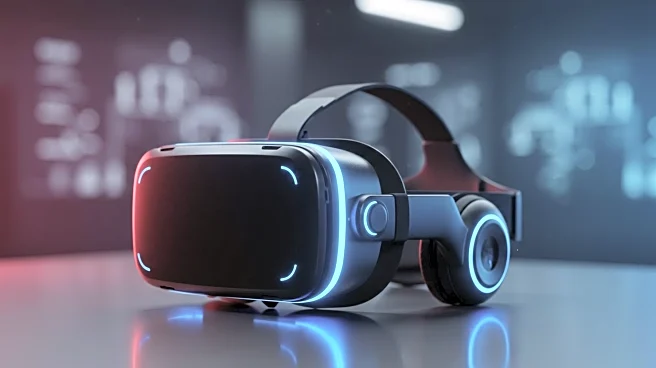What's Happening?
The virtual reality (VR) industry is experiencing a surge of activity with new game releases and hardware updates. Recent highlights include the announcement of Exoshock, a co-operative sci-fi shooter inspired by Halo and Gears of War, set to launch in Fall 2025 on Quest and PC VR. Additionally, Slime Lab, a VR sandbox game, is scheduled for release in January 2026 on Quest and Steam. The VR Games Showcase also featured new trailers for upcoming games like Reach and Grit & Valor - 1949. In terms of hardware, Meta has introduced two prototype headsets, codenamed Boba 3 and Tiramisu, and launched the Quest Runtime Optimizer for Unity to aid developers. Adobe Substance 3D Reviewer is now available on Quest, and Niantic's Spatial SDK v3.15 supports Quest 3 and 3S. These developments indicate a robust pipeline of VR content and technological advancements.
Why It's Important?
These developments are significant as they highlight the growing momentum in the VR industry, which is poised to impact various sectors including gaming, entertainment, and technology. The introduction of new games and hardware innovations suggests a maturing market with increasing consumer interest and investment. This could lead to enhanced user experiences and broader adoption of VR technology. Companies involved in VR development stand to benefit from these advancements, potentially leading to increased revenue and market share. Additionally, the focus on improving developer tools and hardware capabilities may drive innovation and creativity within the industry, fostering a competitive environment that could accelerate technological progress.
What's Next?
The VR industry is expected to continue evolving with further game releases and hardware updates. Stakeholders such as developers, hardware manufacturers, and consumers will likely monitor these developments closely. The upcoming launches of Exoshock and Slime Lab will be key events, potentially influencing market trends and consumer preferences. Additionally, the introduction of new hardware and developer tools may lead to more sophisticated and immersive VR experiences. As the industry grows, there may be increased collaboration between tech companies and content creators to push the boundaries of what VR can offer.
Beyond the Headlines
The advancements in VR technology and content could have broader implications beyond entertainment. For instance, VR's potential applications in education, healthcare, and remote work could transform these fields by providing immersive and interactive experiences. The ethical considerations of VR, such as data privacy and user safety, may also become more prominent as the technology becomes more widespread. Furthermore, the cultural impact of VR, including its influence on social interactions and digital communities, could lead to shifts in how people engage with technology and each other.








